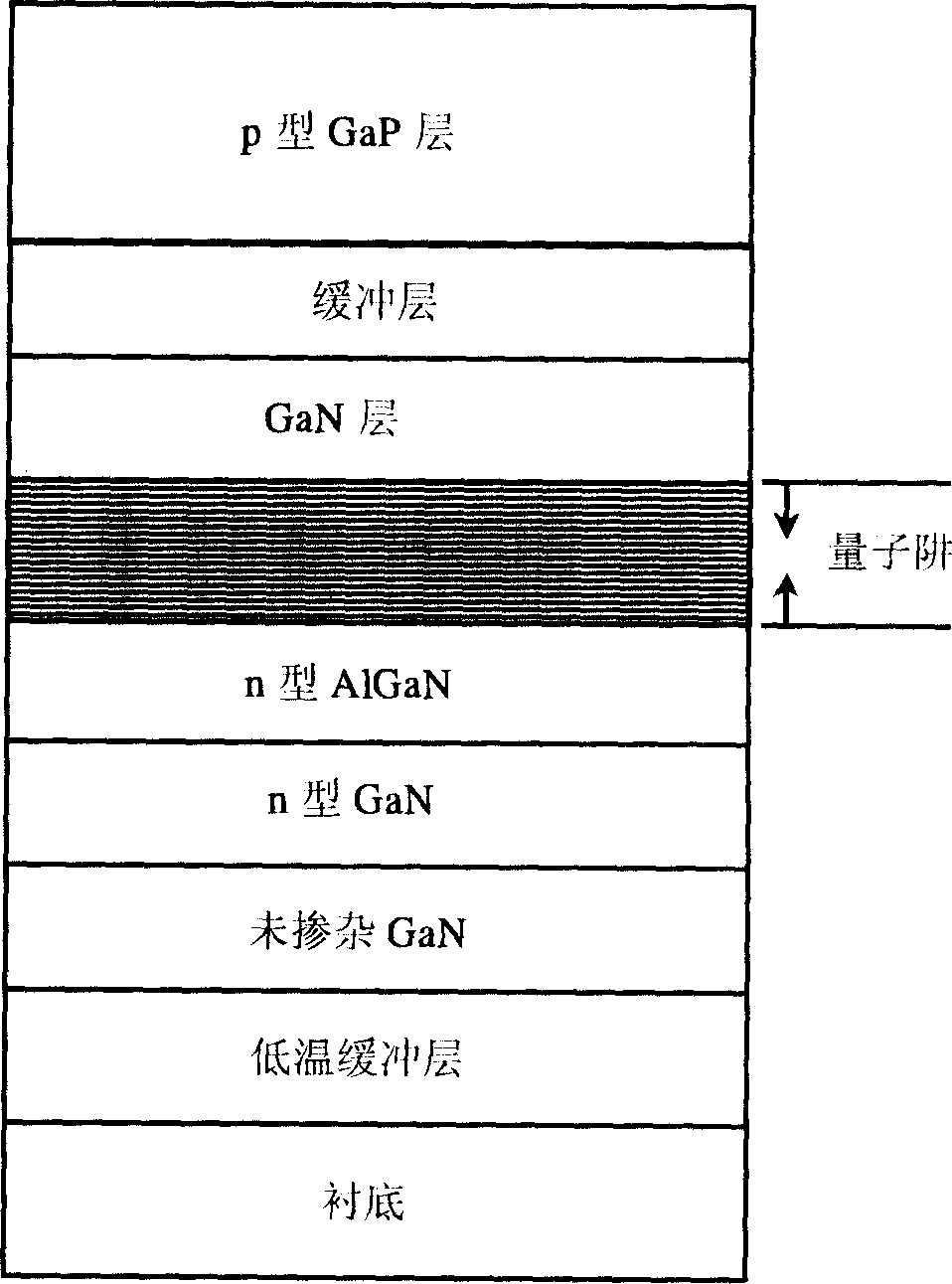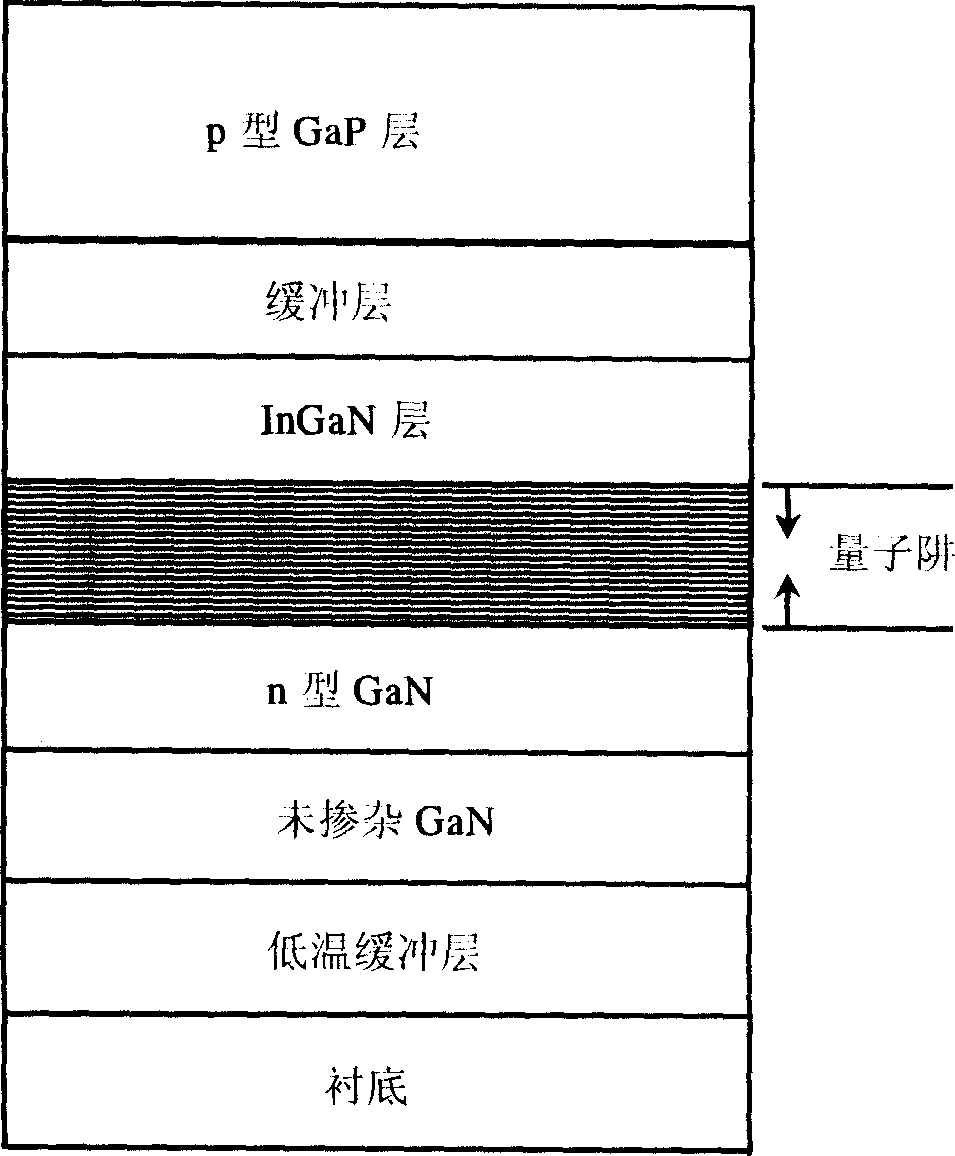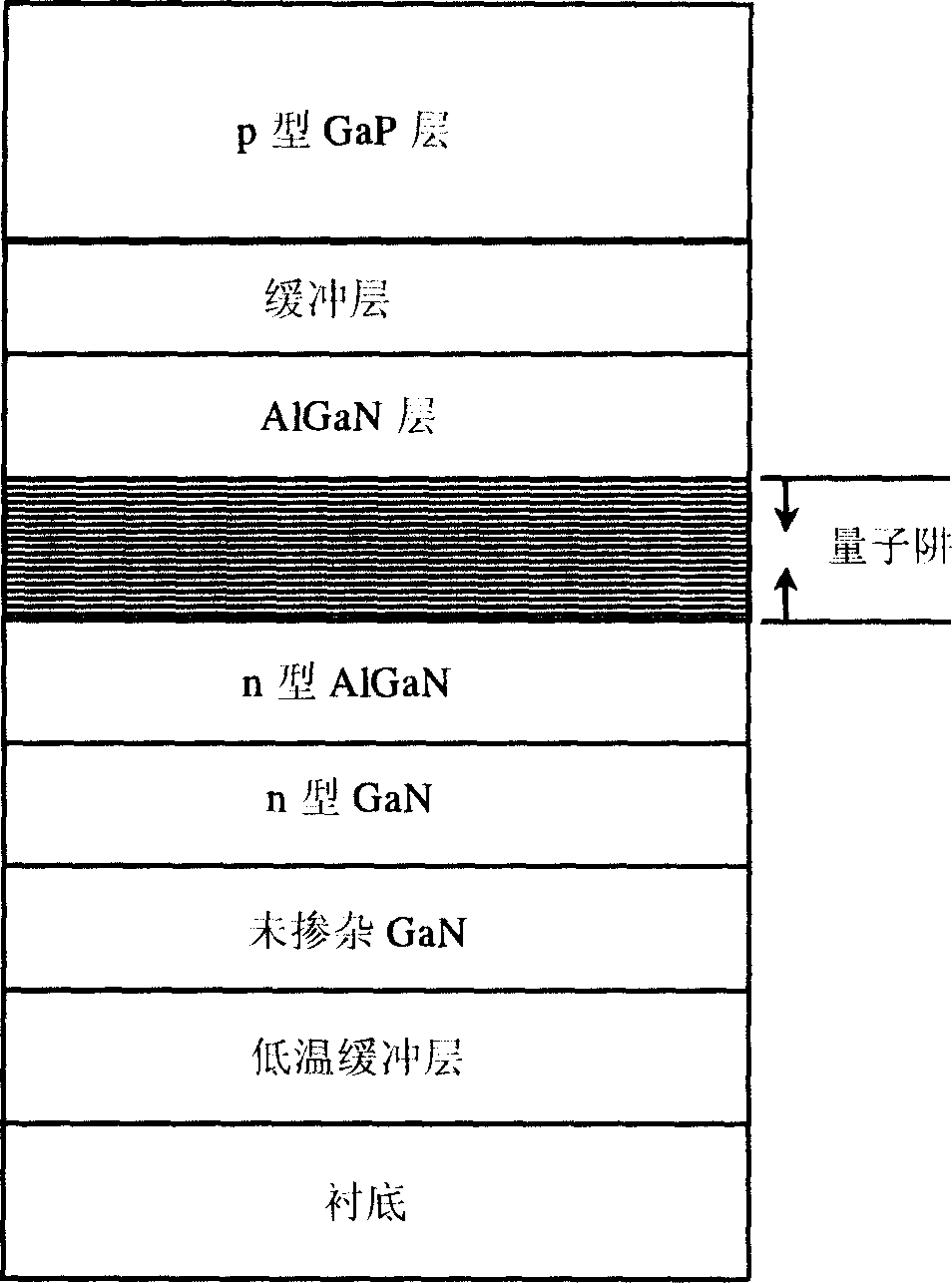GaN-based LED extension sheet and its preparation method
A technology of LED epitaxial wafers and confinement layers, which is applied in the direction of electrical components, circuits, semiconductor devices, etc., can solve the problems of uneven current diffusion and less hole injection, and achieve the goals of improving lumen efficiency, increasing recombination, and enhancing confinement Effect
- Summary
- Abstract
- Description
- Claims
- Application Information
AI Technical Summary
Problems solved by technology
Method used
Image
Examples
Embodiment 1
[0037] The structure of the new GaN-based LED epitaxial wafer is as figure 1 As shown, from bottom to top, they are substrate, low temperature buffer layer, undoped GaN layer, n-type GaN:Si layer, n-type AlGaN:Si layer, quantum well, n-type GaN confinement layer, buffer layer, p-type GaP : Mg layer.
[0038] The preparation method is:
[0039] 1) Adopt GaN dedicated MOCVD, heat up to 1000°C and bake the substrate under hydrogen atmosphere for 10 minutes;
[0040] 2) Cool down to 480°C, and grow a low-temperature buffer layer of GaN with a thickness of 30nm on the substrate;
[0041] 3) Raise the temperature to 1050°C and grow an undoped GaN layer with a thickness of 2.0μm;
[0042] 4) Growing an n-type GaN:Si layer with a thickness of 2.0 μm at a temperature of 1050°C;
[0043] 5) Grow n-type Al with a thickness of 0.1μm at a temperature of 1050℃ 0.1 Ga 0.9 N: Si layer;
[0044] 6) Reduce the temperature to 700℃ to grow In x Ga y N / GaN multiple quantum well structure, the thickne...
Embodiment 2
[0052] The structure of the new GaN-based LED epitaxial wafer is as figure 1 As shown, from bottom to top, they are substrate, low temperature buffer layer, undoped GaN layer, n-type GaN:Si layer, n-type AlGaN:Si layer, quantum well, p-type GaN confinement layer, buffer layer, p-type GaP : Mg layer.
[0053] The preparation method is:
[0054] 1) Adopt GaN dedicated MOCVD, heat up to 1000°C and bake the substrate under hydrogen atmosphere for 10 minutes;
[0055] 2) Cool down to 480°C, and grow a low-temperature buffer layer of GaN with a thickness of 30nm on the substrate;
[0056] 3) Raise the temperature to 1050°C and grow an undoped GaN layer with a thickness of 2.0μm;
[0057] 4) Growing an n-type GaN:Si layer with a thickness of 2.0 μm at a temperature of 1050°C;
[0058] 5) Grow n-type Al with a thickness of 0.1μm at a temperature of 1050℃ 0.1 Ga 0.9 N: Si layer;
[0059] 6) Reduce the temperature to 700℃ to grow In x Ga y N / GaN multiple quantum well structure, the thickne...
Embodiment 3
[0067] The structure of the new GaN-based LED epitaxial wafer is as figure 2 As shown, from bottom to top, it is a substrate, a low-temperature buffer layer, an undoped GaN layer, an n-type GaN:Si layer, a quantum well, an n-type InGaN confinement layer, a buffer layer, and a p-type GaP:Mg layer.
[0068] The preparation method is:
[0069] 1) Adopt GaN dedicated MOCVD, heat up to 1050°C and bake the substrate under hydrogen atmosphere for 8 minutes;
[0070] 2) Cool down to 510°C, and grow a GaN low-temperature buffer layer with a thickness of 25nm on the substrate;
[0071] 3) Raise the temperature to 1000°C and grow an undoped GaN layer with a thickness of 2.5μm;
[0072] 4) Growing an n-type GaN:Si layer with a thickness of 1.0 μm at a temperature of 1000°C;
[0073] 5) Reduce the temperature to 600°C and grow an InGaN / GaN multiple quantum well structure. The thickness of the InGaN well layer is 4nm, the thickness of the GaN barrier layer is 6nm, the In composition of the InG...
PUM
 Login to View More
Login to View More Abstract
Description
Claims
Application Information
 Login to View More
Login to View More - R&D
- Intellectual Property
- Life Sciences
- Materials
- Tech Scout
- Unparalleled Data Quality
- Higher Quality Content
- 60% Fewer Hallucinations
Browse by: Latest US Patents, China's latest patents, Technical Efficacy Thesaurus, Application Domain, Technology Topic, Popular Technical Reports.
© 2025 PatSnap. All rights reserved.Legal|Privacy policy|Modern Slavery Act Transparency Statement|Sitemap|About US| Contact US: help@patsnap.com



